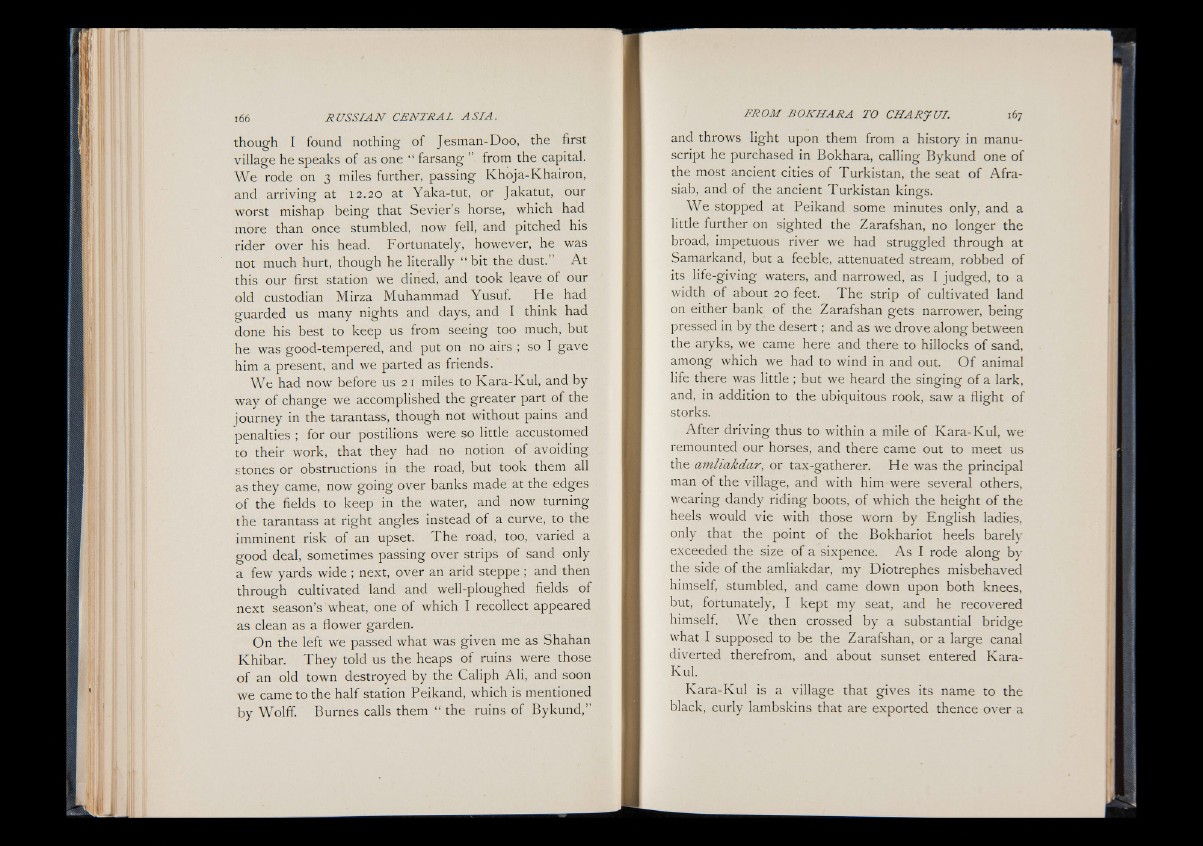
though I found nothing of Jesman-Doo, the first
village he speaks of as one “ farsang ” from the capital.
W e rode on 3 miles further, passing Khoja-Khairon,
and arriving at 12.20 at Yaka-tut, or Jakatut, our
worst mishap being that Sevier’s horse, which had
more than once stumbled, now fell, and pitched his
rider over his head. Fortunately, however, he was
not much hurt, though he literally “ bit the dust.” A t
this our first station we dined, and took leave of our
old custodian Mirza Muhammad Yusuf. He had
guarded us many nights and days, and I think had
done his best to keep us from seeing too much, but
he was good-tempered, and put on no airs ; so I gave
him a present, and we parted as friends.
We had now before us 21 miles to Kara-Kul, and by
way of change we accomplished the greater part of the
journey in the tarantass, though not without pains and
penalties ; for our postilions were so little accustomed
to their work, that they had no notion of avoiding
stones or obstructions in the road, but took them all
as they came, now going over banks made at the edges
of the fields to keep in the water, and now turning
the tarantass at right angles instead of a curve, to the
imminent risk of an upset. The road, too, varied a
good deal, sometimes passing over strips of sand only
a few yards wide ; next, over an arid steppe ; and then
through cultivated land and well-ploughed fields of
next season’s wheat, one of which I recollect appeared
as clean as a flower garden.
On the left w'e passed what was given me as Shahan
Khibar. They told us the heaps of ruins were those
of an old town destroyed by the Caliph Ali, and soon
we came to the half station Peikand, which is mentioned
by Wolff. Burnes calls them “ the ruins of Bykund,”
and throws light upon them from a history in manuscript
he purchased in Bokhara, calling Bykund one of
the most ancient cities of Turkistan, the seat o f Afra-
siab, and of the ancient Turkistan kings.
We stopped at Peikand some minutes only, and a
little further on sighted the Zarafshan, no longer the
broad, impetuous river we had struggled through at
Samarkand, but a feeble, attenuated stream, robbed of
its life-giving waters, and narrowed, as I judged, to a
width of about 20 feet. The strip of cultivated land
on either bank of the Zarafshan gets narrower, being
pressed in by the desert; and as we drove along between
the aryks, we came here and there to hillocks o f sand,
among which we had to wind in and out. O f animal
life there was little ; but we heard the singing of a lark,
and, in addition to the ubiquitous rook, saw a flight of
storks.
After driving thus to within a mile o f Kara-Kul, we
remounted our horses, and there came out to meet us
the amliakdar, or tax-gatherer. He was the principal
man of the village, and with him were several others,
wearing dandy riding boots, of which the height of the
heels would vie with those worn by English ladies,
only that the point o f the Bokhariot heels barely
exceeded the size o f a sixpence. A s I rode along by
the side of the amliakdar, my Diotrephes misbehaved
himself, stumbled, and came down upon both knees,
but, fortunately, I kept my seat, and he recovered
himself. We then crossed by a substantial bridge
what I supposed to be the Zarafshan, or a large canal
diverted therefrom, and about sunset entered Kara-
Kul.
Kara-Kul is a village that gives its name to the
black, curly lambskins that are exported thence over a